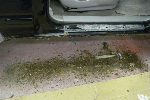Jon M
Well-Known Member
- Joined
- January 12, 2017
- Messages
- 736
- Reaction score
- 155
- City, State
- Mount Pleasant, SC
- Year, Model & Trim Level
- 2015 Explorer XLT
Jon, depending on when yours was built it may or may not have heavy duty brakes.
Peter
I actually measured the rotors, and they're definitely the smaller ones, plus the rear are not vented.











